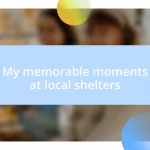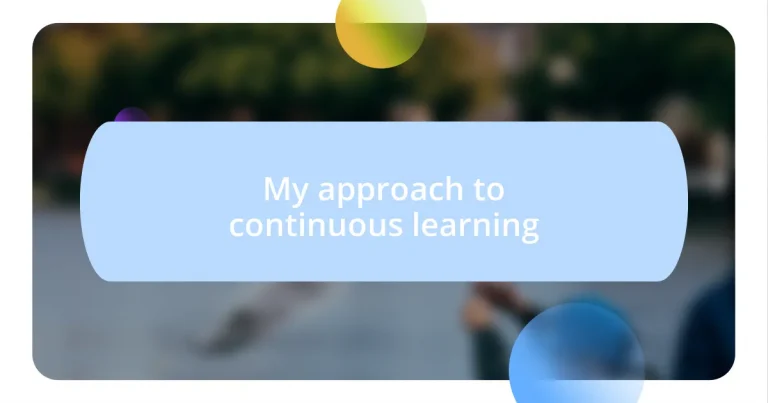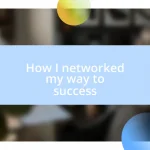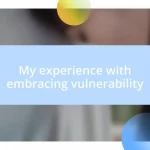Key takeaways:
- Continuous learning enhances personal growth, flexibility, and resilience, enabling adaptation to changes in personal and professional landscapes.
- Setting achievable learning goals by breaking down larger ambitions fosters motivation and a rewarding learning experience.
- Diverse learning resources and peer engagement enrich the educational journey, leading to unique insights and collaborative growth.
- Regularly tracking progress and reflecting on experiences solidifies learning gains and helps refine future goals.
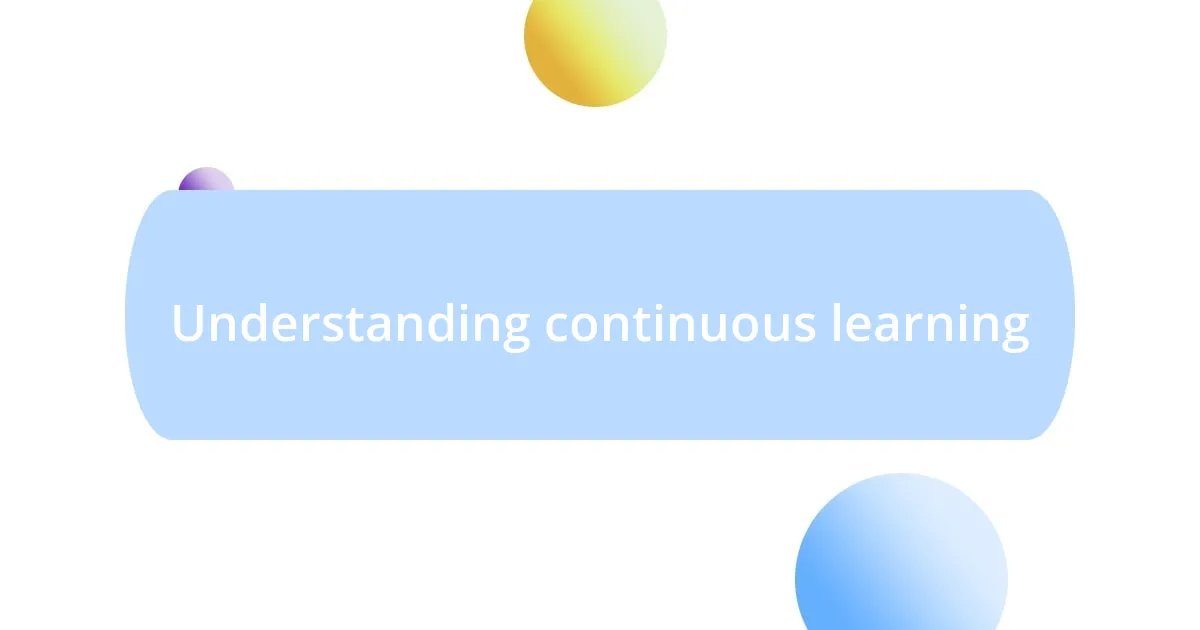
Understanding continuous learning
Continuous learning is about embracing knowledge as a lifelong journey. I remember when I first dove into online courses while working a demanding full-time job. Balancing those commitments felt daunting, yet I found unexpected joy in discovering new concepts that invigorated my existing skills.
Often, I ponder the impact of curiosity on personal growth. Why was I initially hesitant to explore topics outside my comfort zone? I realized that stepping into unfamiliar territories not only broadened my skill set but also awakened a sense of excitement within me. Each new idea became a stepping stone, fuelling my desire to push boundaries.
Moreover, continuous learning fosters resilience in the face of change. Last year, when my industry shifted dramatically, my previous efforts in staying updated made adapting much smoother. It felt empowering to lean on a foundation of knowledge, proving to myself that learning really is a powerful tool in navigating both personal and professional landscapes.
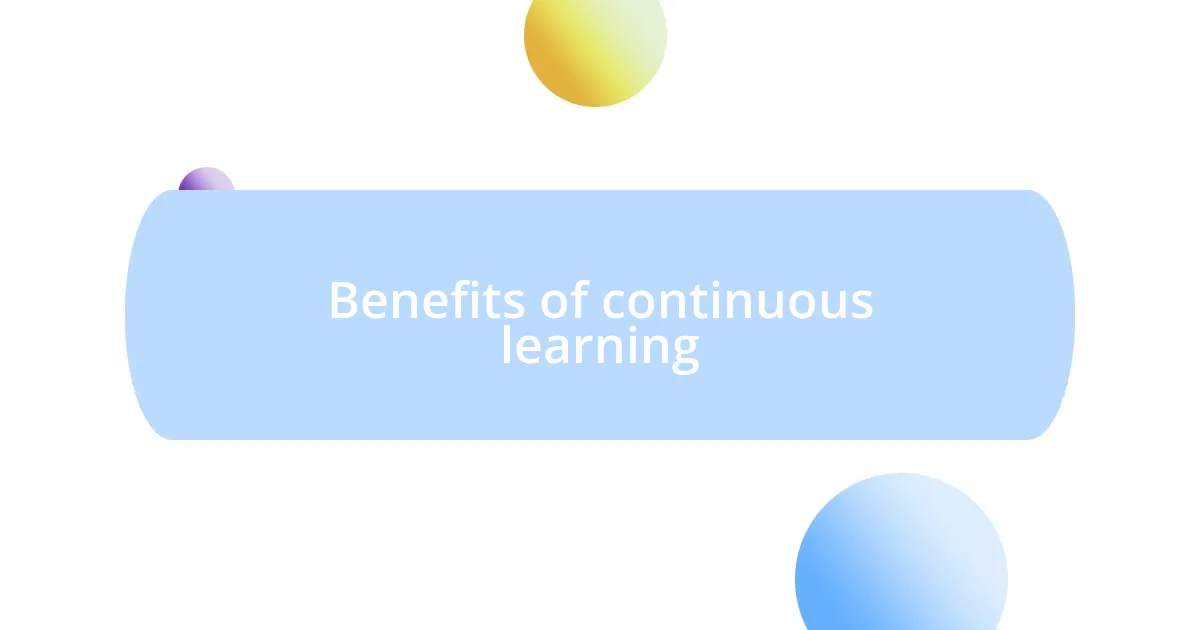
Benefits of continuous learning
Continuous learning creates opportunities that change the trajectory of our careers. There was a time when I hesitated to tackle new projects because I felt unequipped. Then, I took a chance on a webinar outside my field. Not only did it spark innovative ideas, but it also led to a promotion. This experience underscored how knowledge can propel us into paths we might have never considered.
Another fascinating benefit is the enhancement of critical thinking skills. I recall a situation where a simple online course about data analysis transformed my approach to problem-solving at work. As I engaged in analyzing real-world case studies, I started to see patterns and connections that I previously overlooked. This newfound analytical perspective empowered me to contribute more meaningfully to discussions, and I found that others began to rely on my insights.
Lastly, continuous learning nurtures connections with like-minded individuals. I remember attending a networking workshop that opened doors to new friendships and mentorships. Being surrounded by enthusiastic learners reinvigorated my passion. That sense of community not only made the process enjoyable but also provided invaluable support that I could lean on during challenging times. The shared journeys create lasting bonds, enriching both personal and professional lives.
| Benefit | Personal Experience |
|---|---|
| Career Advancement | Participated in a webinar that led to a promotion. |
| Enhanced Critical Thinking | Data analysis course improved my problem-solving abilities. |
| Network Building | A networking workshop introduced me to mentors and new friends. |
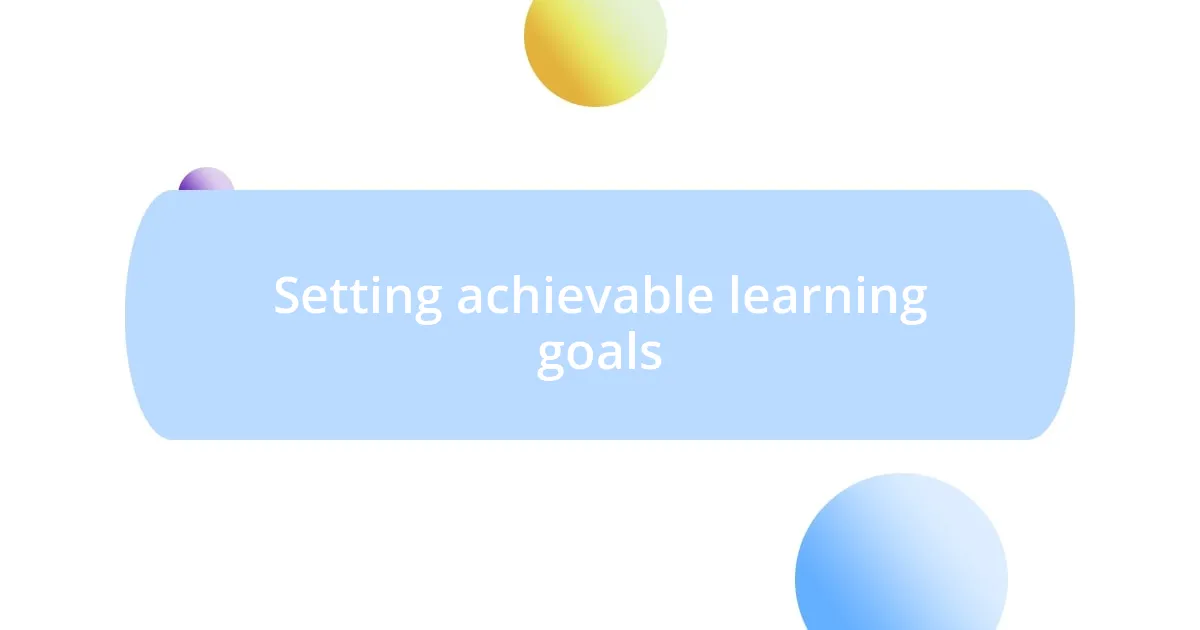
Setting achievable learning goals
Setting achievable learning goals empowers us to navigate the journey of continuous learning with focus and motivation. I vividly recall the time when I set out to learn a new language. At first, my ambition was overwhelming; I wanted to be fluent within a few months. After some reflection, I realized I needed to break that lofty ambition into bite-sized, digestible goals. Setting smaller milestones, like mastering 20 new vocabulary words each week, made the process not only achievable but rewarding, keeping my motivation alive.
To effectively set your own goals, consider the following strategies:
- Be specific: Instead of just saying “I want to learn photography,” specify “I will complete an online course in portrait photography within three months.”
- Make them measurable: Choose goals you can track, like “I will attend one workshop each month.”
- Set a timeline: Having a deadline, such as “I will read one book related to my field every month,” helps maintain focus.
- Start small: Focus on small achievements, such as “I will practice coding for 30 minutes twice a week,” to build confidence.
- Reflect and adjust: Periodically assess your goals and tweak them based on your progress and interests.
Finding that sweet spot where my goals felt challenging yet manageable was a game-changer, turning the learning experience into an exciting and empowering adventure rather than a chore.
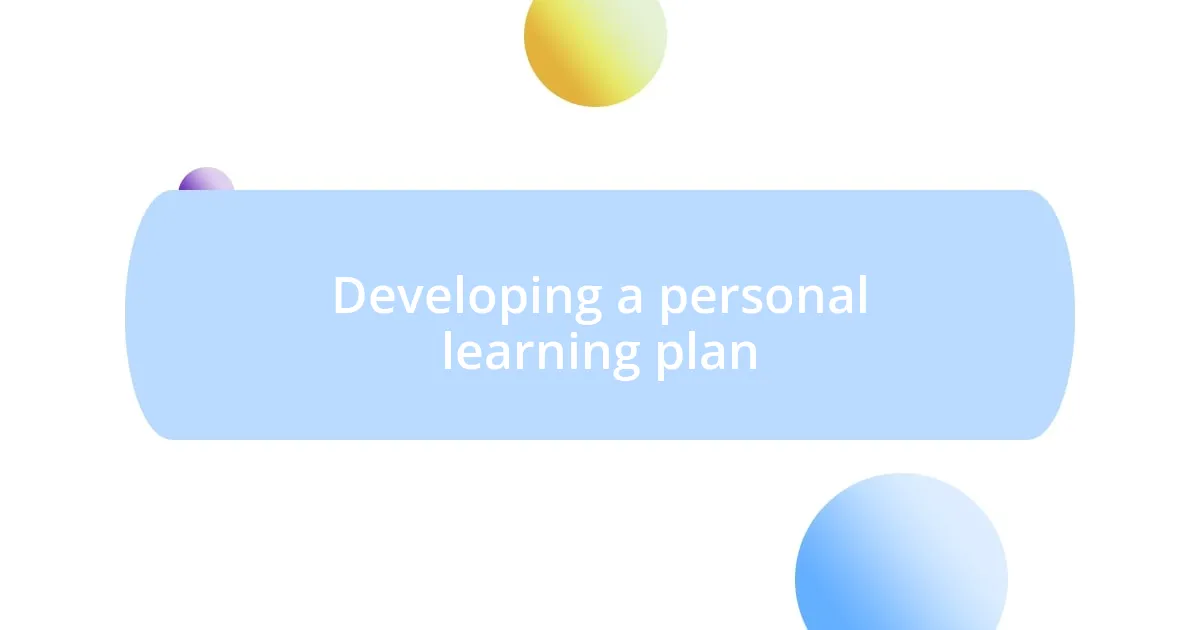
Developing a personal learning plan
Crafting a personal learning plan starts with understanding where you currently stand and where you want to be. I remember when I first sat down to map out my learning journey; it felt a bit daunting. But then, as I listed my skills and aspirations, everything began to light up. During this process, I found that reflecting on my past experiences not only highlighted what I needed to learn but also revealed hidden interests I hadn’t yet explored. Have you ever thought about what truly inspires you?
Next, I believe it’s crucial to identify your preferred learning methods. For instance, I discovered that I retain information better through hands-on experiences rather than just reading. This realization led me to seek out workshops and practical projects. Also, I like to mix it up and explore online courses occasionally, which can be a refreshing change. How do you learn best?
Lastly, I can’t emphasize enough the importance of periodically revisiting and refining your personal learning plan. After shifting gears and trying new things, I found that some initial goals didn’t resonate with me anymore. It’s okay to adjust! Embracing a dynamic approach allows you to align your learning with your evolving interests and career aspirations. Remember, it’s your journey—make it reflective of what truly excites you.
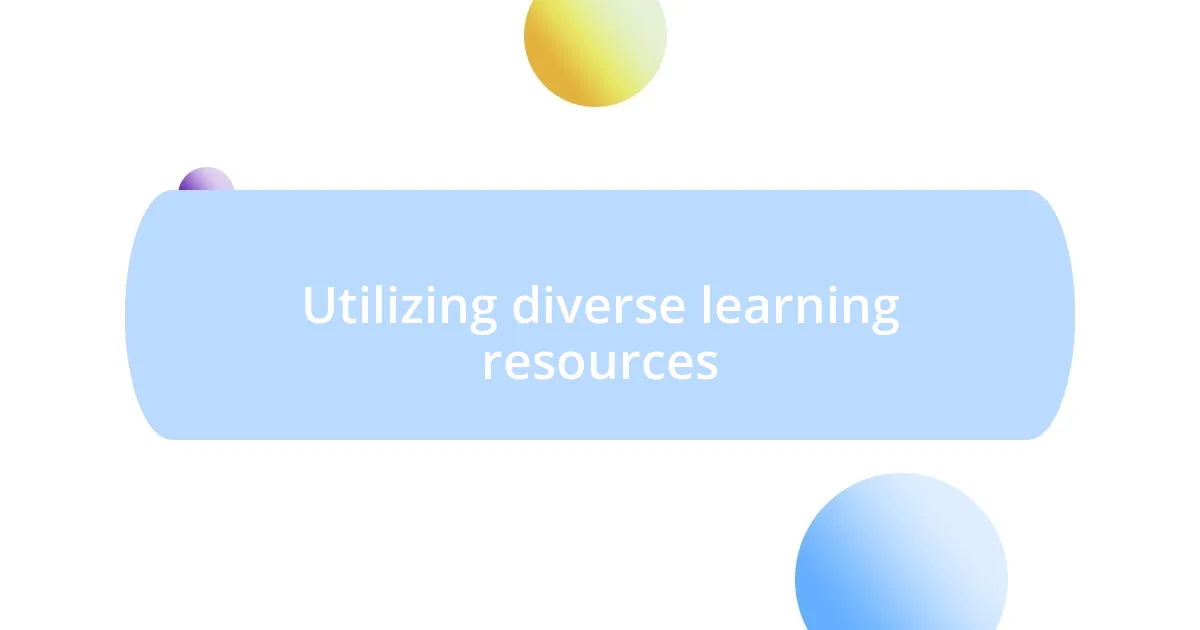
Utilizing diverse learning resources
Utilizing diverse learning resources is essential for a well-rounded educational experience. I recall when I decided to enhance my coding skills; rather than relying solely on textbooks, I explored various platforms like YouTube tutorials, interactive coding sites, and community forums. This blend made the learning process dynamic and enjoyable, and it was fascinating to see how different formats resonated with my understanding.
In my quest for knowledge, I often find inspiration in unexpected places. For instance, attending talks by industry leaders not only expanded my horizon but also sparked ideas that traditional learning couldn’t provide. Have you ever been in a workshop where an offhand comment led to a breakthrough in your thinking? That’s the power of diverse resources—they can open doors to insights you might never encounter in a classroom setting.
Another aspect I cherish is the role of peer learning. I remember forming a study group for a complex topic, where sharing insights and resources transformed our understanding significantly. Engaging with others brings unique perspectives, making the learning experience richer and more collaborative. How often do you explore different channels to learn? Mixing resources keeps your journey stimulating while helping you grasp concepts from multiple viewpoints.
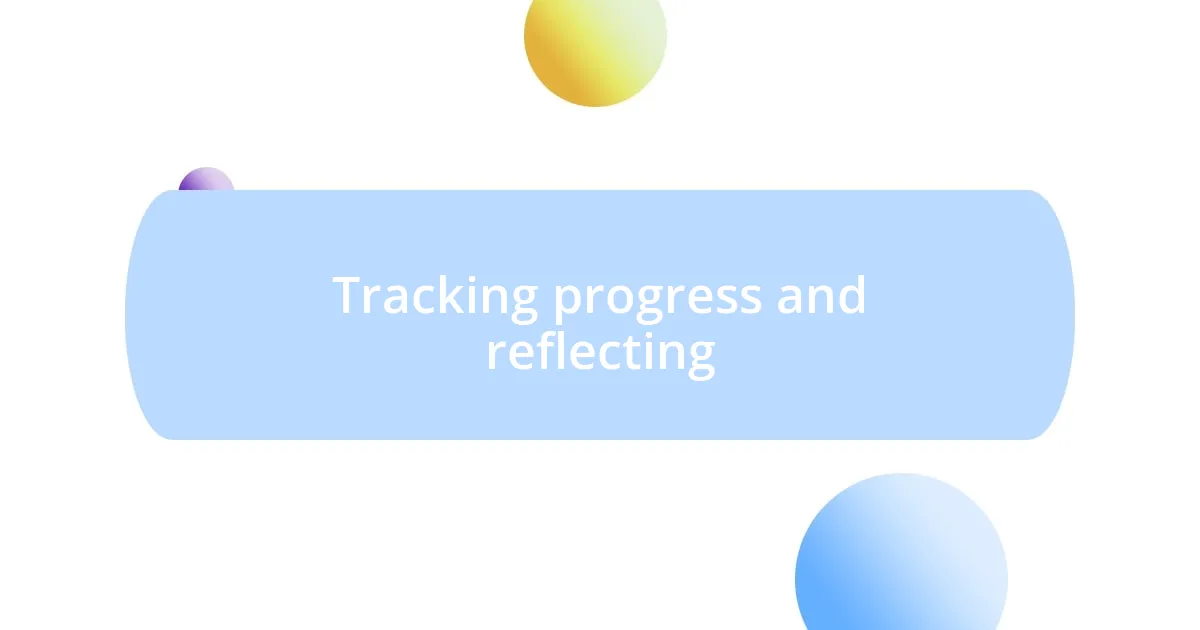
Tracking progress and reflecting
Tracking progress is a fundamental part of continuous learning, and I’ve found that keeping a journal can really enhance this process. I remember starting a simple bullet journal to jot down my daily learning experiences and milestones. Each time I revisited those entries, it was like flipping through a scrapbook of my intellectual growth, allowing me to cherish moments and recognize how far I’ve come. Have you tried documenting your journey in a way that resonates with you?
Reflection goes hand-in-hand with tracking progress. After completing significant learning milestones, I like to set aside time to ponder what worked and what didn’t. I once tackled a challenging online course, and by revisiting my reflections, I realized that collaborative projects brought me the most fulfillment. Understanding these nuances has helped me refine future goals—what does reflection reveal about your learning habits?
Celebrating small victories can also not be overlooked. For instance, when I finally grasped a complex programming concept, I treated myself to a day off to recharge. These moments of joy reinforce my commitment and make the process enjoyable. I believe taking a pause to appreciate accomplishments creates a positive feedback loop that fuels further learning. How do you celebrate your milestones along the way?
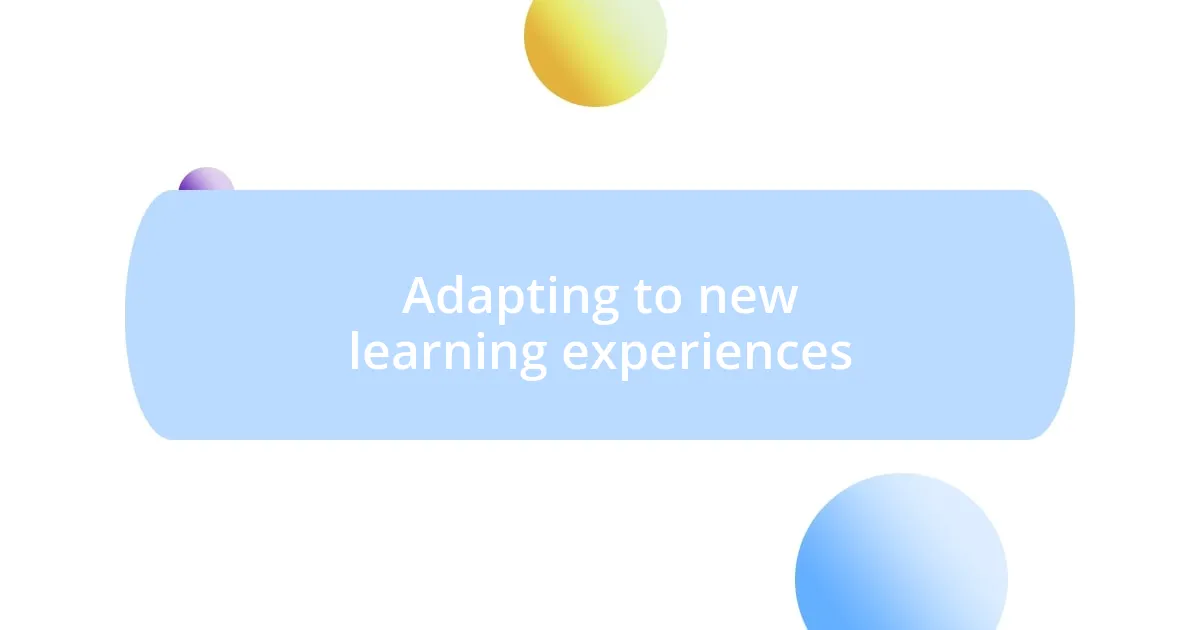
Adapting to new learning experiences
Adapting to new learning experiences can often be a challenging yet rewarding journey. I remember when I first took on public speaking; my heart raced at the thought of presenting in front of an audience. But as I practiced and received feedback, I noticed how my anxiety gradually transformed into excitement. Have you ever pushed yourself into unfamiliar territory, only to find unexpected strengths emerging?
Another memorable instance was when I ventured into online collaboration tools for a group project. Initially, I felt overwhelmed by the technology, but embracing this new way of connecting with peers opened up exciting possibilities. The diverse opinions and immediate feedback made me realize that adapting to new experiences not only builds skills but also enriches my perspective. Isn’t it amazing how stepping outside your comfort zone can lead to personal growth?











